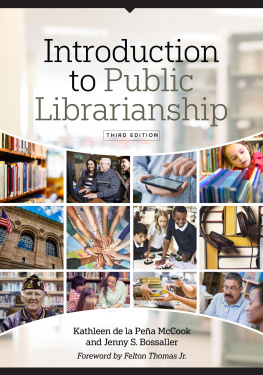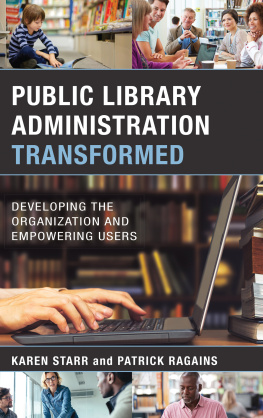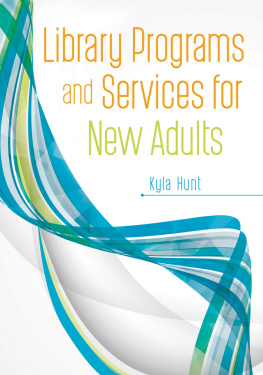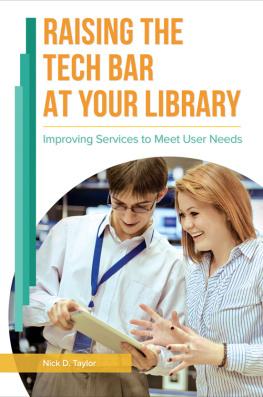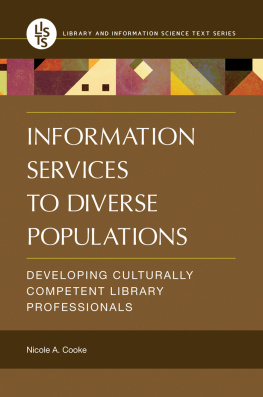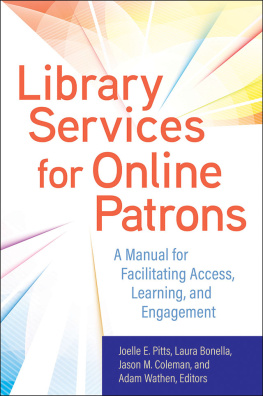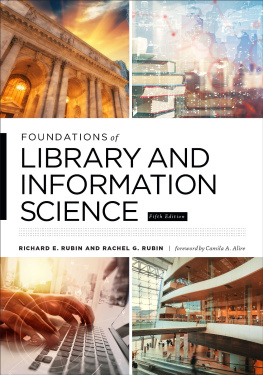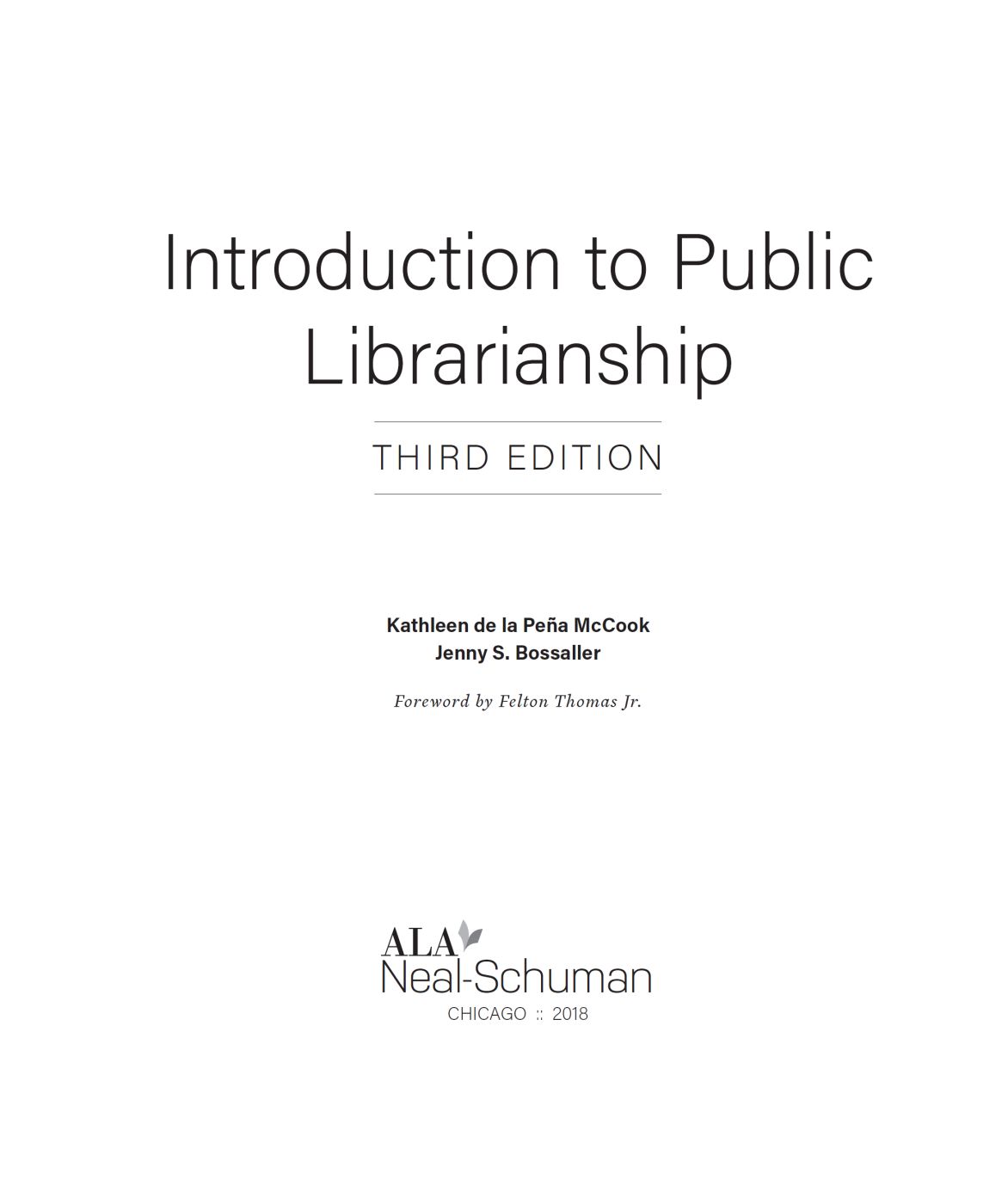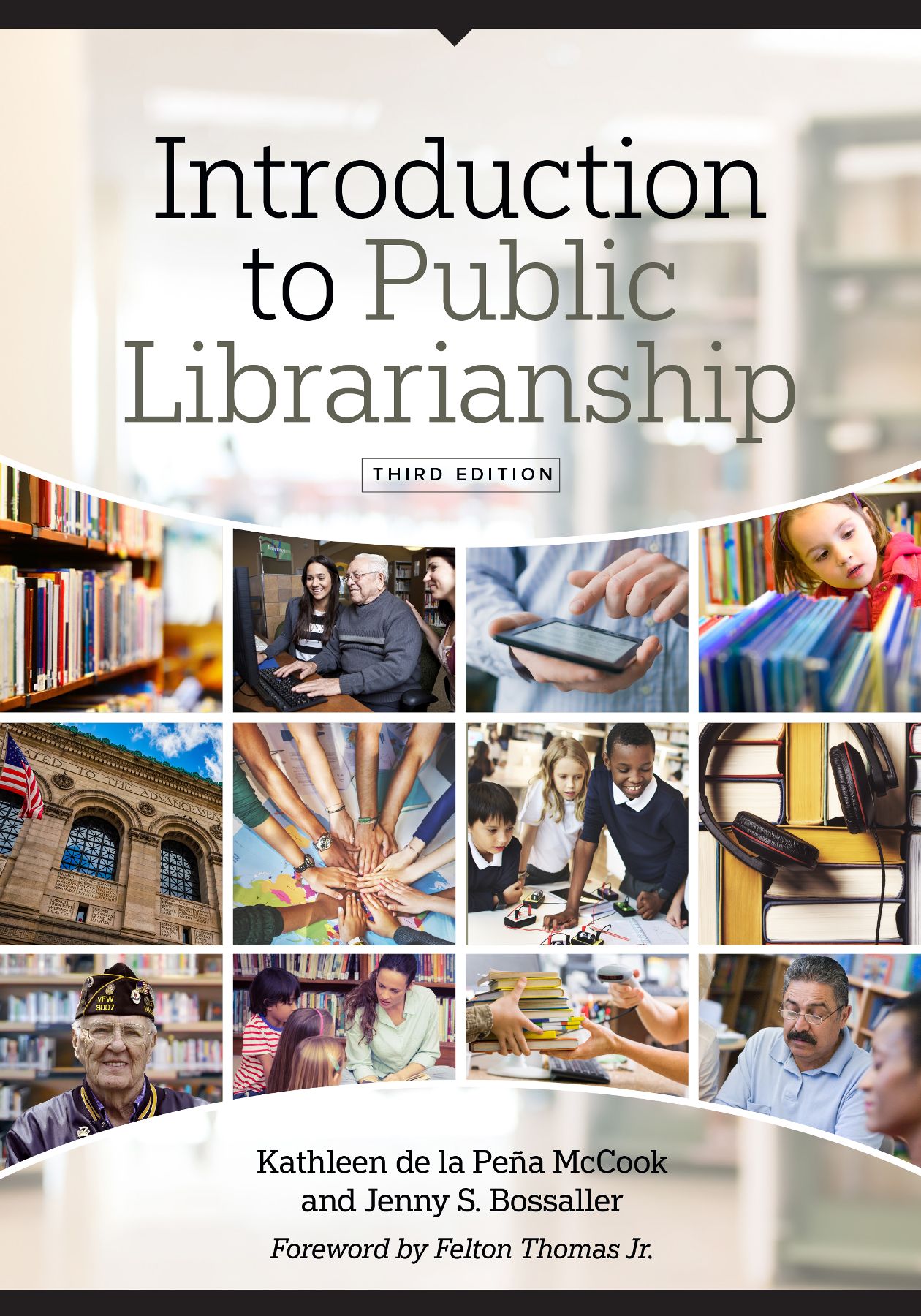
ALA Neal-Schuman purchases fund advocacy, awareness, and accreditation programs for library professionals worldwide.
ADVISORY BOARD
ISMAIL ABDULLAHI, Interim Associate Dean and Professor, School of Library and Information Sciences, North Carolina Central University
ANTHONY BERNIER, Professor, School of Information, San Jos State University
NANCY FREDERICKS, Libraries Administrator, Pasco County Library System (Florida), Adjunct Professor, School of Information, University of South Florida and School of Library and Information Science, Wayne State University
MAURICE WHEELER, Associate Professor, College of Information, University of North Texas
2018 by the American Library Association
Extensive effort has gone into ensuring the reliability of the information in this book; however, the publisher makes no warranty, express or implied, with respect to the material contained herein.
ISBNs
978-0-8389-1506-6 (paper)
978-0-8389-1665-0 (PDF)
978-0-8389-1664-3 (ePub)
978-0-8389-1666-7 (Kindle)
Library of Congress Cataloging-in-Publication Data
Names: McCook, Kathleen de la Pea, author. | Bossaller, Jenny S., 1972, author.
Title: Introduction to public librarianship / Kathleen de la Pea McCook [and] Jenny S. Bossaller; with a foreword by Felton Thomas, Jr.
Description: Third edition. | Chicago: ALA Neal-Schuman, an imprint of the American Library Association, 2018. | Includes bibliographical references and .
Identifiers: LCCN 2017041849 | ISBN 978-0-8389-1506-6 (print : alk. paper) | ISBN 978-0-8389-1665-0 (pdf) | ISBN 978-0-8389-1664-3 (epub) | ISBN 978-0-8389-1666-7 (kindle)
Subjects: LCSH: Public librariesUnited States.
Classification: LCC Z731 .M355 2018 | DDC 027.473dc23
LC record available at https://lccn.loc.gov/2017041849
Cover design by Kimberly Thornton; imagery Adobe Stock.
CONTENTS
by Kathleen de la Pea McCook
by Kathleen de la Pea McCook
by Kathleen de la Pea McCook
by Kathleen de la Pea McCook
by Kathleen de la Pea McCook
by Kathleen de la Pea McCook
by Kathleen de la Pea McCook
by Alicia K. Long
by Kathleen de la Pea McCook and Katharine Phenix
by Jenny S. Bossaller
by Richard J. Austin and Diane Austin
by Clara M. Chu and Barbara J. Ford
Felton Thomas Jr.
A public library saved my life. The audience is usually startled when I share that statement at the beginning of a speaking engagement, but they soon understand how libraries have altered my lifes trajectory. I reveal to them that as a young boy I grew up in one of the poorest and most dangerous neighborhoods in Las Vegas. Drugs and gangs were starting to infiltrate my neighborhood as I began my teenage years. When my two best friends decided to join gangs, I had to make a decision quickly. There werent many options. Much of my neighborhood was either abandoned or burned down, and the only institutions left standing were the churches and the public library.
After school, I would slip away from my friends by telling them that I had homework to do and would go to the library. It was only about 8,000 square feet, and had previously served as a space for social workers to provide services. The Las Vegas-Clark County Library system took it over when the welfare office chose to leave for a bigger space. Although small, it opened the larger world to me. As a young African-American boy from a very poor family, the closest I was going to get to other parts of our country and the world was from the books in the library.
By the end of my eighth-grade year, my friends had stopped asking me to join them, having realized that I was now on a different path. I started going to the library every day after school. Soon the childrens librarian noticed me. You are here so much, you should work here, she quipped. One month later, I began my career in public libraries. I count my blessings every day that I did not go down the same road as my two best friends, both of whose lives have been tragically altered by their choices.
Even now, I can barely believe that the young boy who started working in public libraries at the age of 13 to escape neighborhood gangs would one day be elected president of the Public Library Association, an organization with a membership of 9,000 public library professionals that supports over 16,000 public libraries throughout the country.
The public library hasnt just been a career path for me, it has been my life. This is why the work that is being done to train the next generation of librarians is so important to me. For libraries to continue to alter the lives of the many young people who look to it for salvation, they must be staffed by librarians who are properly prepared. Especially now, as librarians are watching a professional revolution take place right before our eyes, we need library professionals who understand the context of our history and how it influences our possibilities for the future.
In the previous edition of Introduction to Public Librarianship, Dr. Kathleen de la Pea McCook masterfully provided a blueprint for training our new professionals. That book adorned my small shelf of most-consulted books 10 years ago, when I was a mid-level manager. Yellow highlights streaked the articles I used to introduce my colleagues to some of the most important writing on public librarianship. The book is a treasure trove of citations and references for anyone who wants to understand public librarianship.
When I read the second edition of Introduction to Public Librarianship, I realized that the book encompassed the three most important concepts for the next generation of librarians and library professionals. First, it documented how libraries and librarians have shaped the intellectual landscape. Its detailed examination of the history of public librarianship is one of the most thorough assessments Ive encountered. Second, the book provided a remarkable exploration of our core values. Public libraries will begin to falter when we forget the principles upon which they were founded, especially at this time in history, as the foundations upon which democracy was built are being challenged. Finally, and most important to me, Dr. McCook dedicated many pages to the discussion of diversity in our profession. Todays libraries are much more complex and open than their nineteenth- and twentieth-century counterparts, and therefore we must understand our ever-changing communities.
This third edition of Introduction to Public Librarianship shouldnt be read only by those choosing to join our profession. It is also a must-read for the most experienced library professional. Dr. Jenny Bossaller, a professor at the University of Missouri, has collaborated with Dr. McCook on this edition. Dr. Bossallers commitment to the scholarship of community engagement is demonstrated throughout the new edition. Readers will continually find themselves having aha! moments, because Dr. McCook and Dr. Bossaller have revised the previous work in the context of a public library world that has become more global. I have worked in libraries for over 35 years, and have been a librarian for 25 years, but may be more excited about this new revision than Ive been about a library resource to date.
Dr. McCook and Dr. Bossaller identify the public librarys core values as lifelong learning, support for democracy, intellectual freedom, and Internet access. As I meet librarians from across the United States and around the globe, Im heartened by their commitment to these principles. These librarians tell me that our professional associations must do more to speak to these important issues, which are under attack in many communities. I agree with them, but counter that although our associations and institutions must indeed do more, so must all library professionals. This third edition provides the resources we need to make this happen.
Next page
